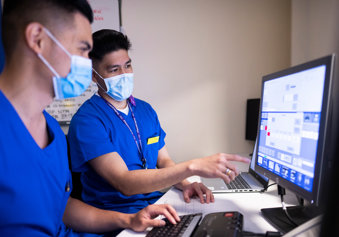Training guidance for clinical radiology
The clinical radiology and interventional radiology curricula are developed to meet GMC standards for post-graduate medical education. The GMC published their latest standards "Excellence by Design" in 2017 and all specialities are updating their curricula to meet the new standards. The Clinical Radiology and Interventional Radiology curricula came into effect in August 2020.
The Gold Guide, published by the Conference of Post-graduate Medical Deans (COPMeD), sets out the arrangements for specialty training as agreed by all four nations' health departments.
Guidance on training in radiology
More and more doctors are choosing to train and work less than full-time. This page explains the different reasons to choose LTFT working, how to apply for it and also provides advice, guidance and support from the RCR's LTFT representatives.
The RCR is keen to support radiology trainees who are returning to training after a period of absence. With this in mind, we have developed a return to training toolkit which provides advice and guidance tailored to radiology. The forms that make up part of this toolkit are available on the e-portoflio. Also under the banner of supported return is information and advice to help you develop your own local return to training course.
There are many out of programme activities that trainees can undertake. This page gives information about the options available and how to apply.
All trainees are required to be involved in some research activity during training and the academic committee has provided some guidance and suggestions on how trainees can achieve this.
You can use the CCT calculator to calculate any adjustment to your CCT date required as a result of periods of LTFT training, out of programme activities, extensions to training, or periods of leave. Please inform the College of any update to your CCT date through the dedicated form on the risr/advance platform/. Please see our dedicated user guides for further information.
Functional and molecular imaging techniques are becoming more prominent in both research institutions and day to day clinical practice. To reflect this, they are included in the clinical radiology curriculum as both core content on the scientific basis of imaging and higher-level content for those wishing to specialise in molecular imaging. In order to help trainees, a variety of resources have been identified and collated for ease of access.
The on-call and handover guidance originally published in 2016 has been updated and is now available. Whilst the RCR cannot define working arrangements, we can give guidance that ensures on-call work for trainees can maximise learning and that appropriate support is available.
Trainees are expected to maintain core competencies throughout their final years of special interest or sub-specialty training.
Health Education England issued some guidance for trainees about providing cross-cover outside their training programmes in times of exceptional service need.
As of 14 May 2013, all mandatory fees paid by medical trainees throughout their training may be tax-deductible. The College can provide receipts for payments made from 14 May 2013, please contact [email protected].
For more information about the legislation or to find out how to receive this tax relief please visit the HMRC website.
Where trainees enter an approved training programme and wish to record previously undertaken exams in their chosen specialty, the College will adopt the guidance of the GMC.
The GMC guidance on currency of exams states "An examination may be taken before the candidate enters the relevant GMC-approved training programme or when they are on a break in the programme. In this scenario, the pass will be considered current as long as the candidate enters or re-enters the programme within seven years of passing the examination and satisfies any other currency requirements determined by the relevant royal college or faculty."
Training roles and responsibilities
RSAs are the regional representatives of the RCR with respect to education and training. Explore the RSAs page to see more about their role, the list of current RSAs and vacancies.
College tutors are appointed to support RSAs. While there will be just one RSA per region, there is likely to be a College Tutor in each training department within a region.
The provision of training and education is a fundamental activity within the NHS and we have issued some guidance about how different training roles should be recognised though SPAs.
Training for supervisors
The RCR runs Supervisor Skills, Training the Trainer and Trainee in Difficulty events throughout the year. See the event listings for dates and details.
Resources for supervisors
HEE has published a suite of resources for supervisors on "Enhancing supervision for postgraduate doctors in training".
Our specialty training
Learn more about how the College sets the standards and curriculum that lead to the award of a Certificate of Completion of Training (CCT) and entry onto the GMC's Specialist Register.
